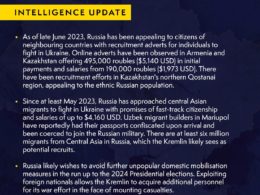Amid the withdrawal of investors from Russia, the world's largest banks tripled their revenue from trading in the Russian ruble last year, Bloomberg reported.
According to Vali Analytics, the total revenue of the world's 100 largest banks from the Russian national currency ruble trading in 2022 amounted to $6 billion, three times higher than in the previous year.
Before the full-scale Russian invasion of Ukraine, ruble trading amounted to $1.5 billion in 2018, $1.8 billion in 2019, $2.1 billion in 2020, and $2 billion in 2021, Bloomberg reported, citing Vali Analytics.
Hundreds of millions of dollars were earned by Wall Street banks in the USA that started trading currency with banks in Kazakhstan and Armenia at a more favorable rate, according to Bloomberg. The volume of such trade reached tens of millions of dollars a day, Bloomberg's sources claimed.
Diamonds for Putin: Russia is still earning $ 20 bn on metals and gemstones
The Wall Street banks sought to exchange their rubles for dollars and took advantage of the situation when Western companies and international investors left the Russian market after Russia's army invaded Ukraine and sanctions were imposed against Russia.
US currency traders found a way to buy up dollars at a low price and then sell them to investors that were leaving Russia at a good margin, without violating sanctions, according to Bloomberg.
US banks traded dollars with creditors in countries Russia considers "friendly" and not subject to US sanctions. Currency traders used Kazakh and Armenian banks as go-betweens. Bloomberg reported that such banks in Kazakhstan as Halyk, Jusan Bank, and Kaspi were part of the scheme, as well as Armenia's Ameriabank.
Microchip backalley: Armenia, Kazakhstan help Russia evade sanctions, produce weapons
According to Bloomberg, the lenders could buy dollars directly from Russian banks at the local exchange rate, which was sometimes significantly lower than abroad. At this point, banks continue to trade currency with Kazakh and Armenian financial organizations, but the deals have become less profitable, unnamed Bloomberg sources claimed.
The US-based Wall Street companies have not been accused of any violations, and there is no suspicion that such transactions violated any sanctions against Russia, according to Bloomberg.
The sources familiar with the deals said that trading in this format allowed their clients to exit assets in Russia and comply with the new rules.
Goldman Sachs, Citigroup, and JPMorgan Chase & Co. declined to comment, while Halyk and Jusan Bank did not respond to Bloomberg's request. The representatives of another Kazakh bank, Kaspi, claimed the bank did not trade rubles in significant volumes with Wall Street organizations or Russian banks.
Related:
- World's largest oil services company SLB halts all product supplies to Russia
- Unsanctioned Russian companies fuel drone & missile attacks





